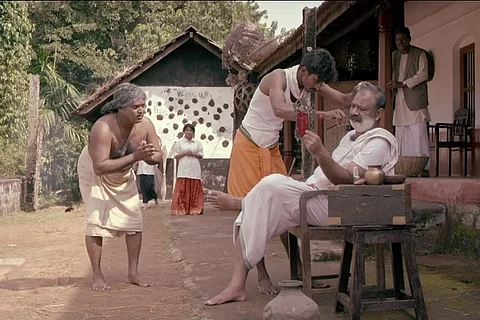

Premiering at the Bengaluru International Film Festival, the Tulu film Pingara was eagerly welcomed by the Tulu community in Bengaluru, at a screening at the Navarang theatre on Monday.
The film is written and directed by Preetham R Shetty, who has previously made Kannada TV serials. This is his first feature film.
Pingara is set in a village in Tulu Nadu, a coastal region in South Karnataka, where Tulu is predominantly spoken. The region is as verdant as it is caste entrenched, as the film shows.The film is named after the Tulu word for areca flowers, a local flower which is specifically used in the Buta Kola ritual prayers, a turning point in the film.
The narrative goes back and forth in time, to tell the story of a family to Sinchana (Chaitanya Chandramohan), a journalist from the city who goes to a village in Tulu Nadu to ‘write on Tulu culture.’
Dodda's (Usha Bandari) husband, Mahabala, (Guruprasad Hegde) is the head of the family and also the land, who tells everyone how to live their lives. One of the workers in his field, Malli (Neema Ray), falls in love with Dodda's nephew, Mohana, played by Sharan Shetty.
As the journalist goes around the property, she sees a pond, which many warn her not to go too close to. However, their words prompt her to pester them about the pond, which leads to Dodda's revelation about the family’s darkest secrets.
The film speaks about caste in a convincing manner, and touches on important aspects, especially about how workers are treated as untouchables in the very fields where they work.
The film speaks about the struggle for land, in the post-independence period. However, the depiction is disturbing to an extent that it feels disempowering. The Dalit family that applies to get land under the Land Redistribution Act, is brutally killed by the land-owner.
The oppressed castes live and die in their oppression. Until the end, they continue to bow in front of the dominant caste people in the village. The writer/director should have had a more empowering vision in narrating the story.
That said, the film shows a side of caste that was practised in the region, that people may not be aware of today. As in Kerala, there were rules on how people were allowed to cover their bodies in South Karnataka, especially those who were engaged in the caste-related work of toddy tapping and brewing.
Ironically, notions of untouchability don't stop the land-owner from forcing his Dalit worker's wife to have sex with him. This scene shows the ultimate hypocrisy of the caste system as was practised in the region.
The film also highlights the ritual of Buta Kola, where persons from the Bileva community, a Dalit caste, listen to the guidance of the family deity. A person is said to take on the spirit (Buta) of the deity through the ritualistic dress and puja, and then answers questions, make prophecies, and curse the family as they see fit.
In the film, the family asks the Buta when the rains will come, and the answer is so vague that it destroys the entire family unit. Each person thinks the cryptic message, 'The rains will come when the person who has done an injustice on this land confesses to me', is about themselves, and ends up taking drastic measures. It was interesting to see the power that the Dalit community is given through the Buta Kola tradition, and the deep respect that the artists receive even to this day, albeit only when they are in costume.
The film ends on a fulfilling note. It wasn't the ending that I was hoping for, but it is one that pleases one’s sense of justice.
The performances are on point, and the emotive acting by Usha Bandari (Dodda) and Neema Ray (Malli) were especially impressive. The background score uses drums to convey emotion, complementing the theme and adding local flavour to the narrative. A popular song from the region is also played throughout. The post-Independence fascination with the radio and playing film songs has been captured well.
The cinematography, however, could have explored the emerald landscape more. There were also too many close-up shots when the characters are speaking.
Overall, Pingara is a good attempt at making a socially conscious film. One feels that there is a need for more region-specific films like this. It shows the immense diversity of the Tulu culture, and will hopefully lead to conversations on its roots and how to preserve or improve it.
The film is yet to release in theatres and is doing its rounds in film festivals for now.
Watch the trailer here